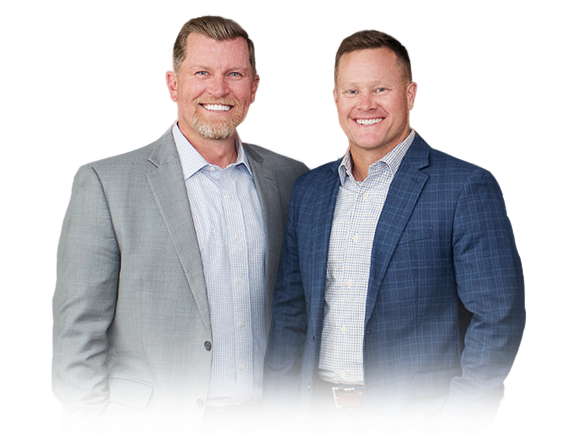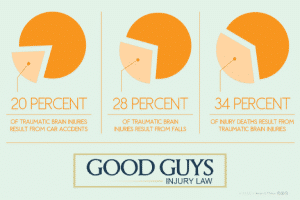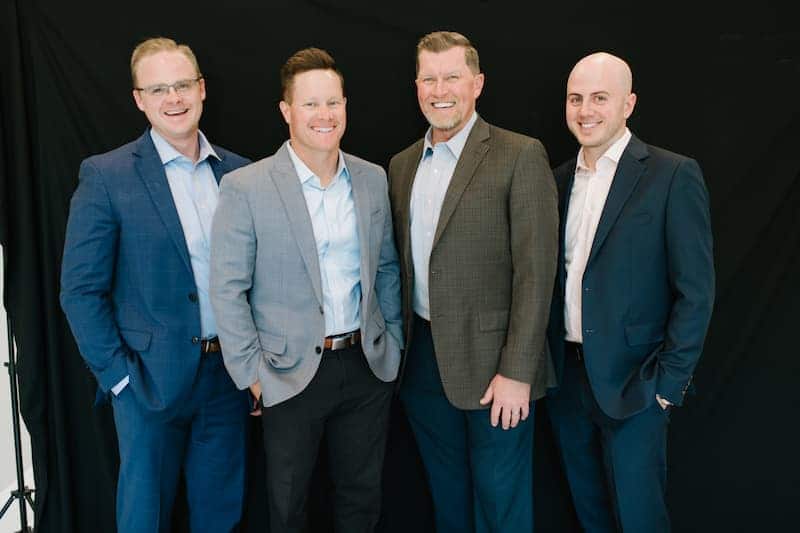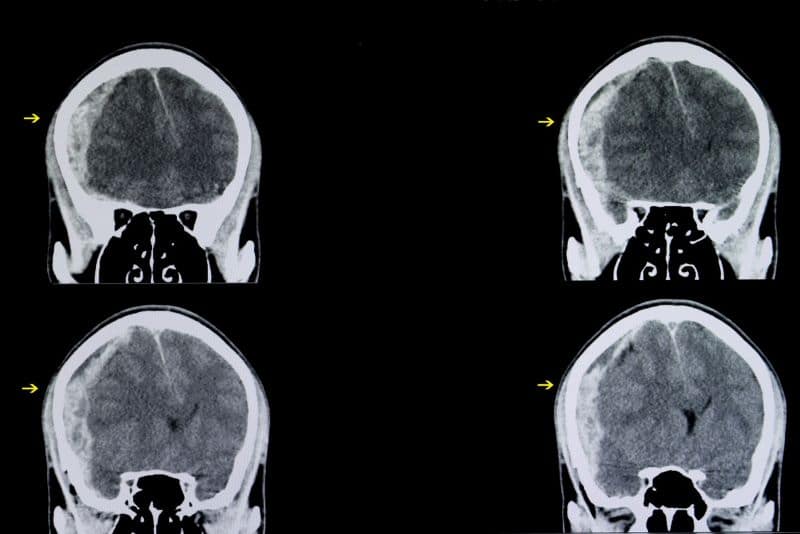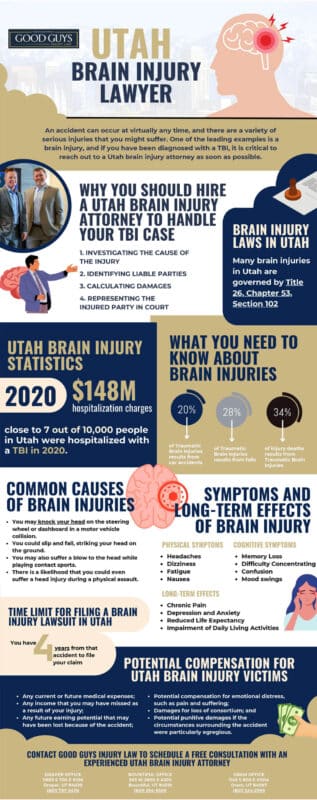An accident can occur at virtually any time, and there are a variety of serious injuries that you might suffer. One of the leading examples is a brain injury, and if you have been diagnosed with a TBI, it is critical to reach out to a Utah brain injury attorney as soon as possible.
At Good Guys Injury Law, the Utah brain injury lawyers from our Utah Personal Injury Attorney law firm have significant experience working with people of all backgrounds. We specialize in brain injury cases and have served on the board of directors for the Brain Injury Alliance of Utah. We will always prioritize your needs, and we can file a personal injury claim on your behalf.
Learn more about how our Utah brain injury attorneys can help you, and give us a call to schedule your free case consultation.
Table of Contents
Why You Should Hire a Utah Brain Injury Attorney To Handle Your TBI Case
There are a handful of important reasons why you should hire a Utah brain injury lawyer to represent you if you have been found to have a traumatic brain injury. Some of the most pressing reasons to hire a lawyer to help with severe brain injury cases include:
1. Investigating the Cause of the Injury
You need a Utah brain injury lawyer who can investigate the cause of the injury on your behalf. For example, you may have been diagnosed with a brain injury due to a car collision, motorcycle crash, truck accident. Or, you may have suffered a hit injury when you slipped and fell.
Determining the cause of the injury will give us an easier time figuring out which party is responsible. Rely on our traumatic brain injury lawyer to assist you in your traumatic brain injury case.
2. Identifying Liable Parties
A Utah brain injury lawyer can also help you identify liable parties. For example, the other driver may be responsible for your injury, or the property owner might be responsible for your injury. Other entities and organizations might also be responsible, so rely on an attorney from our team to help you. We can file a personal injury lawsuit if you have sustained brain damage.
3. Calculating Damages
How much is your injury actually worth? The sole way to answer this question is to work with a lawyer who possesses the know-how in this area. We can calculate potential damages for you and guarantee that you get a fair settlement offer if you have sustained a severe brain injury.
4. Representing the Injured Party in Court
We can take the case to trial if you are not receiving a fair settlement offer. You need a legal professional to represent you in court, and it would be our honor to help you. We can take your case to a judge and jury and let them decide how much your case is worth.
Brain Injury Laws in Utah
Many brain injuries in Utah are governed by Title 26, Chapter 53, Section 102. This title defines a traumatic brain injury as any injury that arises from a decelerating force, accelerating force, or blunt trauma to the head. Even if you feel like the incident was relatively minor, you must make sure that you seek medical treatment as quickly as possible. There may be a time restriction associated with your claim.
Utah Brain Injury Statistics
Brain injuries in Utah may be more common than you think. For example, traumatic brain injury is the leading cause of permanent disability and death in Utah. It cost more than $148 million in hospitalization charges in 2020, and close to 7 out of 10,000 people in Utah were hospitalized with a TBI in 2020.
What You Need To Know About Brain Injuries
There are several key facts you need to know about traumatic brain injuries. They include:
- TBIs can result from either blunt or penetrating traumatic events.
- Traumatic brain injuries can vary significantly in terms of their scope and severity.
- Some of the most typical forms of traumatic brain injuries include concussions, cerebral contusions, and skull fractures.
- Some brain injuries require emergency surgery.
- Head injuries can also lead to complications that may affect you for the remainder of your life.
Because every brain injury is different, you must seek medical care immediately.
Common Causes of Brain Injuries
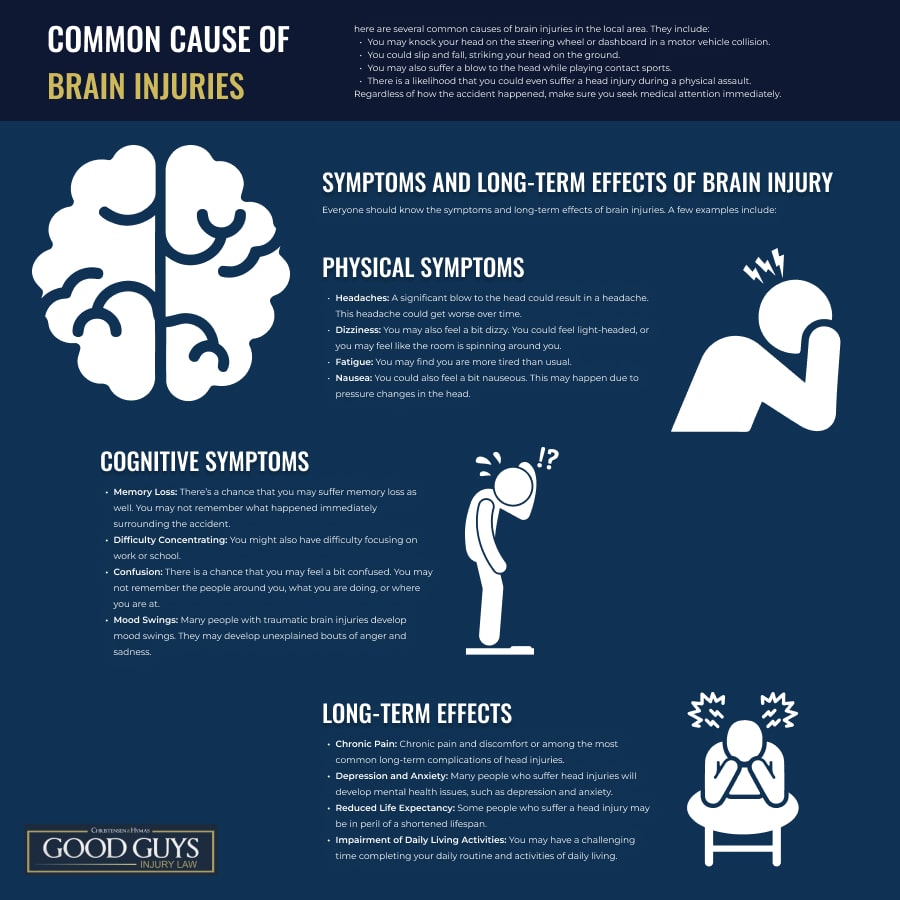
There are several common causes of brain injuries in the local area. They include:
- You may knock your head on the steering wheel or dashboard in a motor vehicle collision.
- You could slip and fall, striking your head on the ground.
- You may also suffer a blow to the head while playing contact sports.
- There is a likelihood that you could even suffer a head injury during a physical assault.
Regardless of how the accident happened, make sure you seek medical attention immediately.
Symptoms and Long-Term Effects of Brain Injury
Everyone should know the symptoms and long-term effects of brain injuries. A few examples include:
Physical Symptoms
- Headaches: A significant blow to the head could result in a headache. This headache could get worse over time.
- Dizziness: You may also feel a bit dizzy. You could feel light-headed, or you may feel like the room is spinning around you.
- Fatigue: You may find you are more tired than usual.
- Nausea: You could also feel a bit nauseous. This may happen due to pressure changes in the head.
Cognitive Symptoms
- Memory Loss: There’s a chance that you may suffer memory loss as well. You may not remember what happened immediately surrounding the accident.
- Difficulty Concentrating: You might also have difficulty focusing on work or school.
- Confusion: There is a chance that you may feel a bit confused. You may not remember the people around you, what you are doing, or where you are at.
- Mood Swings: Many people with traumatic brain injuries develop mood swings. They may develop unexplained bouts of anger and sadness.
Long-Term Effects
- Chronic Pain: Chronic pain and discomfort or among the most common long-term complications of head injuries.
- Depression and Anxiety: Many people who suffer head injuries will develop mental health issues, such as depression and anxiety.
- Reduced Life Expectancy: Some people who suffer a head injury may be in peril of a shortened lifespan.
- Impairment of Daily Living Activities: You may have a challenging time completing your daily routine and activities of daily living.
Brain Injuries & Medical Malpractice

Even though doctors are expected to treat brain injuries, there may be situations where medical malpractice could lead to a brain injury. For example, oxygen impairment could lead to a brain injury, or a surgical complication could also lead to a head injury. If you develop a brain injury after a visit to a doctor, reach out to us to schedule a case consultation.
How to File a Brain Injury Lawsuit
If you are interested in filing a brain injury lawsuit, you must have a valid claim. That’s why contacting us to schedule your case consultation as quickly as possible would be the best decision.
We can review the evidence related to your case, listen to how the accident unfolded, conduct a full investigation, and file a brain injury lawsuit on your behalf if we feel you deserve compensation. Call us to arrange your free case consultation.
Time Limit for Filing a Brain Injury Lawsuit in Utah
There is a time restriction within which you need to file your brain injury lawsuit in Utah. Following a severe accident resulting in a head injury, you have four years from that accident to file your claim. If you file a claim after this window has closed, your claim could be dismissed even if you have a valid claim. That is why calling us is critical to schedule a case consultation as quickly as possible.
Potential Compensation for Utah Brain Injury Victims
We can file a personal injury claim on your behalf and pursue compensation. We can seek compensation for a variety of damages, including:
- Any current or future medical expenses;
- Any income that you may have missed as a result of your injury;
- Any future earning potential that may have been lost because of the accident;
- Potential compensation for emotional distress, such as pain and suffering;
- Damages for loss of consortium; and
- Potential punitive damages if the circumstances surrounding the accident were particularly egregious.
You must make sure you recover all compensation to which you are entitled. For that reason, reach out to us to schedule your case consultation.
Contact Good Guys Injury Law To Schedule a Free Consultation With an Experienced Utah Brain Injury Attorney
At Good Guys Injury Law, we have significant experience representing people who have suffered brain injuries, and we can represent you as well.
Our Utah brain injury lawyer is ready to listen to your case and advocate for your rights. Remember that you never have to walk through this difficult situation alone, so call us today to schedule a free case consultation with a team member.
Brain Injury FAQs
Traumatic brain injury (TBI) is a sudden trauma to the head resulting in damage to the brain. It may also be called a head injury. This injury may result from a car accident, slip and fall, assault, workplace accident, oxygen deprivation, or sports accident. A brain injury impacts the brain in a way that temporarily or permanently interferes with normal consciousness and brain function.
A person who has sustained a brain injury may experience relatively mild symptoms such as dizziness, fatigue, and headache. Severe manifestations of the injury may include a loss of consciousness, seizures, slurred speech, confusion, loss of coordination, and coma.
What is the difference between a concussion and a contusion?
A concussion results from a blow to the head, which causes the brain to strike the skull. It can cause temporary loss of functioning. A contusion is a bruise to the brain and may include a skull fracture. Both concussions and contusions are serious brain injuries, and both injuries may occur concurrently.
A skull fracture results in damage to the skin and bone of the skull as well as to the brain itself. The severity of the injury and treatment varies with the location of the fracture. Many skull fractures result in mild to severe problems associated with daily functioning such as walking, memory, vision, and behavior.
A coma is a prolonged state of unconsciousness that can last hours, days, or weeks depending on the severity of the brain damage. There is no response to external stimuli and an absence of speech. The victim may appear to be sleeping or in a vegetative state.
Rehabilitation is the medical treatment process that helps an individual reach optimum brain function. Various professional services may be involved, including primary physicians, physical, occupational and speech therapists, neuropsychologists, social workers, therapeutic recreational specialists, and nurses.
In addition to healthcare professionals, family members are also a critical part of any recovery after a brain injury. The effectiveness of care can depend on the assistance and cooperation of the patient and family members. Understanding the needed medical care, needed support from family members and related costs are critical for valuing a brain injury legal claim.
Read more about the University of Utah’s rehabilitation program.
The assistance available for brain injury victims and their families depends on the cause of the injury and the damage. Government disability programs like SSI (Supplemental Security Income) and SSDI (Social Security Disability Income) may be available. If the injury occurs at work, workers’ compensation may apply.
Various non-profit organizations, foundations, community groups, and religious organizations may provide support and assistance. In addition, the victim may qualify to claim financial compensation through a legal action that may cover a range of damages, including medical bills, lost income, household support, mental suffering, and physical pain.
Recovery from a brain injury depends on the nature and severity of the damage and the victim’s treatment. Knowing the prognosis for recovery is an essential part of any legal claim.
Utah Brain Injury Lawyer CLIENT REVIEW
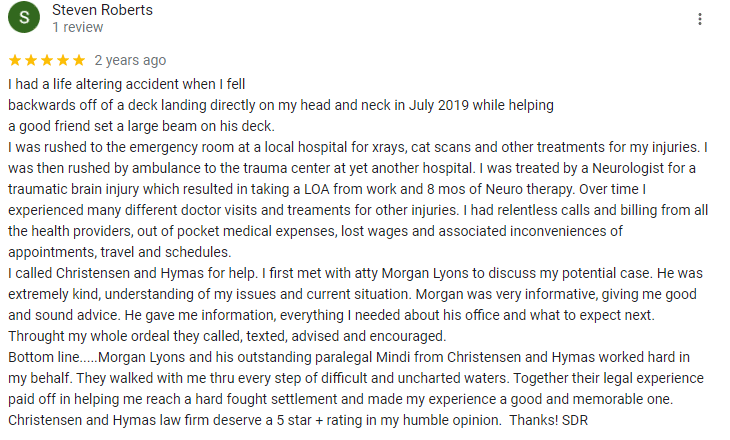
https://goo.gl/maps/cGq88gnj7MyNiunN7
Read more of our client testimonials here.
